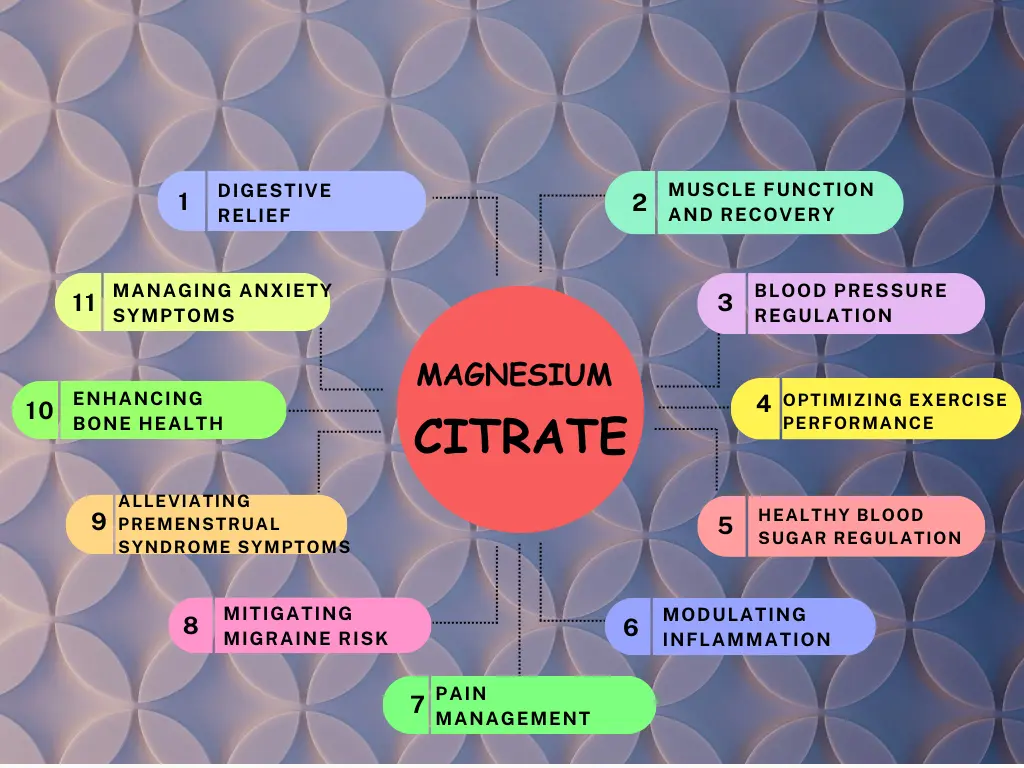Magnesium Citrate: Unveiling the Science Behind Sleep, Digestion, and More
Magnesium, the fourth most abundant mineral in the human body, plays a crucial role in over 600 cellular reactions [1]. But with the hustle and bustle of modern life, deficiencies are becoming increasingly common. This is where magnesium citrate comes in, a bioavailable form that offers a range of potential health benefits [2].
Magnesium citrate exists in several forms, but the most common type used in supplements is trimagnesium dicitrate. Chemically, it’s a white, crystalline powder with the formula C12H10Mg3O14. This formula indicates that three magnesium cations (Mg²⁺) are bound to two citrate anions (C₆H₅O₇³⁻) [3]. Magnesium citrate production typically involves a reaction between magnesium oxide or carbonate and citric acid in a heated water solution. Citrate itself is a molecule derived from citric acid, a naturally occurring organic acid found in citrus fruits.
The presence of these citrate anions makes magnesium citrate highly soluble in water, allowing for easier absorption in the body compared to other magnesium compounds [4]. This high bioavailability due to its favorable pharmacokinetics is also the reason why chelated magnesium citrate is commonly used as a laxative, as it draws water into the intestines to stimulate bowel movements.
Stuck? Magnesium Citrate Might Be the Quick Fix You Need
Magnesium citrate laxative is a popular over-the-counter option for occasional constipation relief. As an osmotic laxative, an OTC laxative, it draws water into your intestines, softening stool and prompting bowel movements within 30 minutes to 6 hours. While effective, it’s best suited for short-term use due to potential side effects like diarrhea and dehydration [5]. If you experience chronic constipation, consult a doctor to explore alternative solutions. Beyond magnesium citrate, explore natural constipation relief with a high-fibre diet, hydration, probiotics, exercise, stress management, and natural laxatives like prunes.
Sleep Saviour? Exploring the Magnesium-Melatonin Connection
When dealing with occasional constipation, some people find relief with magnesium citrate. But research suggests Magnesium Citrate: May Promote Better Sleep [6]. Struggling to unwind? Magnesium might be a natural sleep aid. It supports the production of GABA, a calming neurotransmitter that quiets brain activity [7]. This can ease tension and promote relaxation, preparing your body for restful sleep. Magnesium citrate is a popular form for mind and muscle relaxation. Additionally, magnesium may influence melatonin regulation, the hormone that governs our sleep-wake cycle [8]. Studies have shown that magnesium citrate for sleep is a readily available supplement with potential sleep-supportive properties. magnesium supplementation can improve sleep quality in individuals with insomnia, particularly those with magnesium deficiency [9,10].

Beyond Sleep: Unveiling the Versatility of Magnesium Citrate
While improved sleep is a welcome benefit, magnesium citrate’s potential extends far beyond. Here’s a glimpse into other promising areas of research:
- Muscle Function and Recovery: Magnesium citrate supplementation may improve exercise performance and reduce muscle soreness after workouts [11].
- Blood Pressure Regulation: Studies suggest that magnesium citrate may help lower blood pressure, particularly in individuals with prehypertension or mild hypertension. It keeps the cardiovascular system healthy [12].
- Optimizing Exercise Performance: Research suggests that magnesium citrate supplementation improves exercise performance, potentially allowing muscles to work harder and longer during physical activity [13].
- Supporting Healthy Blood Sugar Regulation: Studies indicate that magnesium citrate enhances insulin sensitivity that helps in management of blood sugar levels [14].
- Modulating Inflammation: magnesium citrate supplementation may help mitigate inflammatory responses in the body [15].
- Potential Role in Pain Management: Given its anti-inflammatory properties, magnesium citrate may also be helpful in managing pain associated with conditions like arthritis and fibromyalgia [16].
- Mitigating Migraine Risk: Fortunately, supplementation with magnesium citrate may help prevent migraines or lessen the severity of migraine [17].
- Alleviating Premenstrual Syndrome (PMS) Symptoms: magnesium supplements are a popular recommendation for preventing cramps and some premenstrual syndrome (PMS) symptoms such as bloating and mood swings [18].
- Enhancing Bone Health: Magnesium citrate supplementation ensures adequate magnesium levels for strong bones, potentially benefiting individuals with osteoporosis [19].
- Managing Anxiety Symptoms: Magnesium citrate is thought to contribute to the regulation of neurotransmitters, potentially promoting a calmer and more relaxed state [20].

Important Considerations: Dosage and Potential Side Effects
Magnesium citrate is generally safe for most adults when taken in recommended doses [21]. What is the magnesium citrate dosage for bowl cleansing? Adults and children 12 years and older should use 195 to 300 ml of magnesium citrate with a full glass of water.
For optimal absorption, separate magnesium citrate intake by 2 hours from other medications.
Magnesium supplements are always recommended to be taken with a meal. While effective for temporary constipation relief, magnesium citrate uses shouldn’t become a regular laxative. Magnesium citrate side effects. The most frequent ones are digestive issues like stomach cramps, gas, nausea, and diarrhoea [22,23]. These are usually mild and temporary. In rare cases, more serious side effects can occur, including persistent diarrhoea, severe abdominal pain, slow heartbeat, and muscle weakness[24,25]. If you experience any of these, it’s important to stop taking magnesium citrate and consult your doctor right away. Warning signs of magnesium citrate overdose may include sluggish heartbeat, severe sleepiness, disorientation, and muscle weakness [26].
Optimizing Your Magnesium Intake: Food vs. Supplements
While magnesium citrate supplements offer a convenient way to boost your levels, incorporating magnesium-rich foods into your diet is a great first step. Boost your magnesium intake naturally with leafy greens, nuts, seeds, beans, whole grains, and wheat bran. taking magnesium citrate with a meal, especially one rich in fibre [27]. Remember to hydrate after taking magnesium citrate: down an 8 oz / 240 ml glass of water (unless your doctor says differently) to prevent dehydration.
Recommended Dietary Allowances (RDAs) for Magnesium [28]
| Age | Male | Female | Pregnancy | Lactation |
| Birth to 6 months | 30 mg* | 30 mg* | ||
| 7–12 months | 75 mg* | 75 mg* | ||
| 1–3 years | 80 mg | 80 mg | ||
| 4–8 years | 130 mg | 130 mg | ||
| 9–13 years | 240 mg | 240 mg | ||
| 14–18 years | 410 mg | 360 mg | 400 mg | 360 mg |
| 19–30 years | 400 mg | 310 mg | 350 mg | 310 mg |
| 31–50 years | 420 mg | 320 mg | 360 mg | 320 mg |
| 51+ years | 420 mg | 320 mg |

Magnesium citrate benefits
For healthy people with well-functioning kidneys, excessive magnesium citrate intake may be eliminated naturally [29].
Magnesium citrate is considered safe to be used during pregnancy [30].
Early research (2003) points to magnesium citrate benefits as potentially having superior absorption compared to magnesium oxide and magnesium chelate [31].
Comparing Magnesium Supplements: Citrate, Glycinate, Oxide, and More
Magnesium citrate vs magnesium glycinate: Magnesium glycinate is known for its calming effects and is less likely to cause digestive issues compared to the more laxative-prone magnesium citrate.
Magnesium oxide vs magnesium citrate: Magnesium oxide is less bioavailable and primarily used for its strong laxative effects, while magnesium citrate is better absorbed and gentler on the stomach.
Magnesium vs magnesium citrate: Magnesium refers to the essential mineral in various forms, with magnesium citrate being a specific type known for its high absorption and use in relieving constipation.
Magnesium carbonate vs magnesium citrate: Magnesium carbonate is less soluble and often used as an antacid, while magnesium citrate is more soluble and effective for increasing magnesium levels and relieving constipation.
Magnesium malate vs magnesium citrate: Magnesium malate is often used for muscle fatigue and fibromyalgia, while magnesium citrate is favored for its general absorption and digestive benefits.
Milk of magnesia vs magnesium citrate: Milk of magnesia, containing magnesium hydroxide, is primarily an antacid and laxative, while magnesium citrate is better absorbed and used for its broader health benefits.
Magnesium bisglycinate vs magnesium citrate: Magnesium bisglycinate is highly bioavailable and gentle on the stomach, making it ideal for long-term supplementation compared to the more laxative magnesium citrate.
Magnesium citrate vs magnesium carbonate: Magnesium citrate is more bioavailable and used for supplementation and constipation relief, while magnesium carbonate is used mainly as an antacid.
Magnesium citrate vs Miralax: Magnesium citrate is a naturally occurring mineral supplement with laxative effects, while Miralax (polyethylene glycol) is a synthetic laxative used for treating constipation.
Magnesium chloride vs magnesium citrate: Magnesium chloride is well-absorbed and often used for topical applications, while magnesium citrate is ingested for its high bioavailability and digestive benefits.
Conclusion:
Magnesium Citrate – A Promising Player in Overall Health
Magnesium citrate is a versatile supplement with a growing body of research supporting its potential benefits for sleep, digestion, and overall health and wellness. If you’re considering supplementation, consult your doctor to determine if it’s right for you and establish the appropriate dosage. Remember, a balanced diet rich in magnesium-containing foods can also significantly contribute to your well-being.
1. Johnson, J. Does magnesium citrate work for constipation? MedicalNewsToday. https://www.medicalnewstoday.com/articles/322588
2. WebMD Editorial Contributor, Health Benefits of Magnesium Citrate, WebMD. https://www.webmd.com/diet/health-benefits-magnesium-citrate
3. Marcin, A. How to Use Magnesium Citrate for Constipation, Healthline. https://www.healthline.com/health/digestive-health/magnesium-for-citrate-constipation
4. Magnesium Citrate – Uses, Side Effects, and More, WebMD. https://www.webmd.com/drugs/2/drug-522-2202/magnesium-citrate-oral/magnesium-citrate-oral/details
5. Magnesium Citrate Solution, Cleveland clinic. https://my.clevelandclinic.org/health/drugs/20745-magnesium-citrate-solution
6. Northrop, A. and Wallace, T. Magnesium Citrate: Uses, Side Effects And Warnings, ForbesHealth. https://www.forbes.com/health/supplements/magnesium-citrate/
7. Kubala, J. Health Benefits of Magnesium Citrate, Health. https://www.health.com/magnesium-citrate-8607721
8. Tresca, J. A. The Health Benefits of Magnesium Citrate, verywellhealth. https://www.verywellhealth.com/magnesium-citrate-benefits-side-effects-dosage-and-interactions-4177658
9. https://www.yashodahospitals.com/medicine-faqs/magnesium-citrate/
10. https://www.medicoverhospitals.in/medicine/magnesium-citrate
11. Ogbru, O. magnesium citrate, MedicineNet. https://www.medicinenet.com/magnesium_citrate-oral/article.htm
12. What is magnesium citrate? Your solution to constipation, Holland &Barrett, 2022. https://www.hollandandbarrett.com/the-health-hub/vitamins-and-supplements/supplements/magnesium-citrate/
13. magnesium citrate (OTC), Medscape. https://reference.medscape.com/drug/magnesium-citrate-342017
14. Levy, J. Magnesium Citrate Benefits (Including for Constipation), Dr. Axe, 2022. https://draxe.com/nutrition/magnesium-citrate-benefits/
15. Phuong, M. V. How to Use Magnesium Citrate for Constipation,VINMEC. https://www.vinmec.com/en/gastroenterology-hepatobiliary/health-news/how-to-use-magnesium-citrate-for-constipation/
16. Drugs and Lactation Database (LactMed®) [Internet]. Bethesda (MD): National Institute of Child Health and Human Development; 2006-. Magnesium Citrate. [Updated 2024 Jan 15]. Available from: https://www.ncbi.nlm.nih.gov/books/NBK500569/
17. Andomian, N. Magnesium for Constipation: How to Choose Which Type Is Best for You, GoodRxHealth. https://www.goodrx.com/conditions/constipation/magnesium-for-constipation
18. https://www.myactivehealth.com/hwcontent/content/multum/d01008a1.html
19. MAGNESIUM CITRATE, RXLIST. HTTPS://WWW.RXLIST.COM/MAGNESIUM_CITRATE/GENERIC-DRUG.HTM
20. Felman, A. Can magnesium help with constipation? Zoe. https://zoe.com/learn/does-magnesium-help-you-poop
21. Magnesium citrate, mrmed.in. https://www.mrmed.in/molecule/magnesium-citrate
22. https://www.fda.gov/safety/recalls-market-withdrawals-safety-alerts/vi-jon-llc-expands-voluntary-nationwide-recall-magnesium-citrate-saline-laxative-oral-solution-lemon
23. Adult Bowel Program: Clean Out With Magnesium Citrate, gilettechildren’s. https://www.gillettechildrens.org/your-visit/patient-education/adult-bowel-program-clean-out-with-magnesium-citrate
24. https://www.sciencedirect.com/topics/agricultural-and-biological-sciences/magnesium-citrate
25. Magnesium citrate, Memorial Sloan Kettering Cancer Centre. https://www.mskcc.org/cancer-32care/patient-education/medications/adult/magnesium-citrate
26. Magnesium citrate Side Effects, Drugs.com. https://www.drugs.com/sfx/magnesium-citrate-side-effects.html
27. Magnesium Citrate Supplements: 9 Major Benefits, VIEROOTS. https://vieroots.com/blogs/news/blog-magnesium-citrate-supplements-9-major-benefits?gad_source=1&gclid=CjwKCAjwp4m0BhBAEiwAsdc4aIKlUcFbCtenLdUD_xNtxgGRk-CwdzA1agclErXmHJnzrTsbxn4hoxoCFoMQAvD_BwE
28. Magnesium, National Institutes of Health Office of Dietary Supplements. https://ods.od.nih.gov/factsheets/Magnesium-Consumer/
29. Venter, R. N. 6 Benefits of Magnesium Citrate, moonjuice. https://moonjuice.com/blogs/supplements/benefits-of-magnesium-citrate
30. Jenessa, Magnesium Citrate | The Benefits & Dosage, MYVEGAN. https://www.myvegan.com/blog/supplement/magnesium-citrate-the-benefits-dosage/
31. Lee, L. How to Drink Citrate of Magnesium, wikihow. https://www.wikihow.com/Drink-Citrate-of-Magnesium
Magnesium citrate is a bioavailable form of magnesium, a mineral essential for many bodily functions. It’s commonly used as a dietary supplement and for occasional constipation relief.
Magnesium citrate acts as an osmotic laxative by drawing water into the intestines, which softens the stool and stimulates bowel movements.
Magnesium citrate may support better sleep, improve muscle function and recovery, regulate blood pressure, optimize exercise performance, enhance blood sugar regulation, modulate inflammation, manage pain, reduce migraine risk, alleviate PMS symptoms, and enhance bone health.
Yes, magnesium citrate may promote better sleep by supporting the production of GABA, a calming neurotransmitter, and influencing melatonin regulation, which governs the sleep-wake cycle.
Common side effects include digestive issues like stomach cramps, gas, nausea, and diarrhea. Rare but serious side effects can include persistent diarrhea, severe abdominal pain, slow heartbeat, and muscle weakness.
